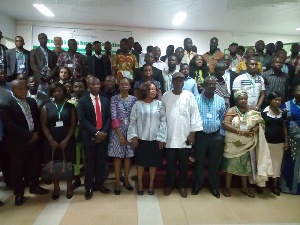 Attendees of the Green Business Forum in a group picture
Attendees of the Green Business Forum in a group picture
Mr Papa Bartels, Team Leader, Industrial Sub-Contract and Partnership Exchange, Ministry of Trade and Industry, has said government is to develop a comprehensive Small and Medium Enterprises (SMEs) policy to regulate the sector.
He said the development of the policy would help sanitise the system and address challenges in the business space and deal with bad SME operators.
“The policy will help build the capacity of SMEs, and curb issues of environmental challenges and ensure business sustainability in the country,” he added.
Mr Bartels said this in Accra at a Green Business Forum organised by the Ghana Climate Innovation Centre (GCIC) and the United Nations University Institute for Natural Resources (UNA-INRA) in Africa on the theme: “Green Businesses in Ghana: Opportunities for Growth”.
Green business ensures that the structural transformation process avoids stranded assets, copes with accelerated urbanisation, reduces resources inputs and increases efficiency in the production process and minimises waste.
The Forum is supported by the World Bank, the Ministry of Foreign Affairs of the Netherlands, the Embassy of Denmark, and InfoDev.
He said the Ministry had partnered with stakeholders in the industry to come out with the Ghana Social Enterprise Policies to address challenges associated with green businesses.
Mr Bartels said under the industrial revitalisation agenda, distressed and challenged local entities would be helped to access medium to long-term finances.
He said the government would also establish a $2-billion Industrial Development Fund which would be used to invest in some strategic anchor industries, in partnership with the private sector.
Mr Bartels said the one-district, one-factory policy was among the 10-point pillar of government industrial transformation agenda.
He said other pillars include the establishment of industrial parks or zones in all 10 regions, which will be Free Zone enclaves, with access to reliable energy supply and utility to help industries grow.
The rest are job creation, industrial sub-contracting exchange, enhancing domestic retail infrastructure, improving the business environment through regulatory reforms and improving public-private sector dialogue.
Dr Eric Twum, Policy Fellow, UNU-INRA, said one of the major challenges facing African governments was how to promote sustained economic growth and inclusive wealth creation that enhances livelihoods and bridges inequalities.
He said green economy, green industrialisation and green business have become major concepts in economic and development policy discussions culminating into a paradigm shift in the global development focus from the conventional development to sustainable green growth.
Ms Ruka Sanusi,the Executive Director of GCIC, said the centre is a business incubator that supports local small and medium enterprises to successfully commercialise and scale up the most innovative business solutions to climate change.
She said the centre provides technical know-how as well as structured, bespoke business advisory services that enable entrepreneurs to elevate their entrepreneurial potential and optimise their successes.
Mr Prince Akpesey, Vice President, Portfolio Operations, Databank Agrifund Manager Limited said it was imperative for small businesses to develop a proven business model to attract investors.
Mrs Levina Owusu, Director of Policy Planning, Monitoring and Evaluation, Ministry of Environment, Science, Technology and Innovation said green business was the sustainable business to venture into.
She urged industries to protect the environment from land degradation and deforestation especially individuals that cut down trees to do well to replenish them by planting a tree.